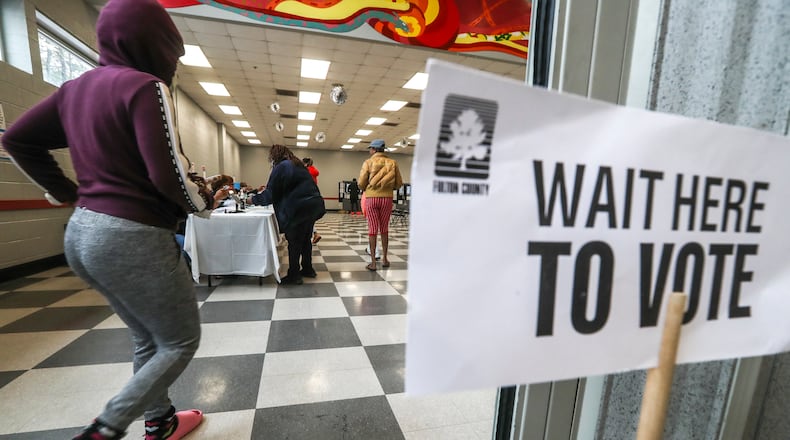Georgia Secretary of State Brad Raffensperger has taken on election denialists, most notably former President Donald Trump’s call to “find 11,780 votes.” For that, we owe him our thanks. Trump and his cohorts, many based in Georgia, tried to do everything they could to steal, nullify or overturn Georgia’s 2020 presidential election, and Raffensperger could have joined other current or former elected officials in aiding in that process. But he stood firm, and many independents and Democrats joined Republicans in rewarding him for doing his job. He and Gabe Sterling convincingly demonstrated there was no voter fraud and Georgia’s election laws were strong and fair.
That’s why it’s disheartening and frankly upsetting to see Raffensperger’s defense of actions which he supported that make it more difficult to vote. In a Wall Street Journal editorial headlined “Raphael Warnock, Election Denier,” Raffensperger calls out re-elected Sen. Raphael Warnock for crying voter suppression. But Warnock has merely pointed out many of Raffensperger’s actions that line up more with Trump than the secretary would care to admit. If there were no voter fraud, how can Raffensperger advocate for more difficult voter procedures which discourage full voter participation? A cynic would suggest it is for political purposes.
You can start with the atrocious administration of the 2020 June primary which saw a botched rollout of the new voting machines. In the middle of a pandemic, many voters in Fulton County waited in line for three hours or more, even though Raffensperger had delayed the presidential primary and the general primary that year to give time to fix lingering issues. Instead of saying the buck stopped with him, he asked the state legislature to give him the authority to intervene in county election offices that had issues.
He could have merely acknowledged that Fulton, as the largest county, was going to be more prone to rollout issues than smaller counties. But his actions laid the groundwork for future conspiracy theories that Trump seized on and ultimately put Fulton election workers’ lives in danger.
After the 2020 election, Raffensperger took credit in mainstream quarters for its orderly count and recount and for standing up to efforts to overturn it. As a nonpartisan election administrator, he could have been justifiably proud of the ease with which millions of Georgia voters used absentee ballots, drop boxes and long early-voting periods to break turnout records in both the general election and early January Senate runoffs, but instead Raffensperger helped author SB202, which sought to overhaul Georgia’s successful election process mostly because it produced winners for the wrong party.
Even though Sen. Warnock won, it’s not hysterics or election denialism to point out legitimate things that contributed to voter suppression which can be traced directly to Raffensperger’s election bill. Those include, but are not limited to:
- Voters, including many college students, not receiving absentee ballots in time or at all. In both the general election and general election runoff, Cobb County was forced by a court to extend the deadline for receipt of ballots after more than 1,000 voters didn’t receive theirs on time. SB202 shortened the window for when absentee ballots could be requested and mailed out, putting undue strain on large counties like Cobb and the mostly Democratic voters who are using absentee ballots these days.
- Long early vote lines in the runoff – SB 202 shortened the runoff window from 9 weeks to 4 weeks. Certainly 9 weeks is too long, but 4 weeks is too short, particularly in light of the unnecessary extra burdens of SB202. The long lines were made even worse by SB202, which criminalized handing out water or pizza to those waiting in those lines for no reason other than the perception and reality that early voting benefits Democrats. And for some reason, SB202 mandates that early in-person voters are required to complete the same paperwork as mail-in absentee voters; lines could be shortened considerably if all in-person voters – whether early or election day – are treated the same.
- Questionable legal interpretations like ruling that the Saturday after Thanksgiving couldn’t be used for early voting. When this was overturned, it ended up benefiting Democrats as their counties were motivated to open that day while mostly Republican counties stayed closed. Even though I’m a Democrat, I think democracy works better when everyone can participate, including Republicans. I’m against voter suppression no matter who it impacts.
Republicans have pointed to the high turnout in Georgia – particularly by voters of color – to rebut claims of voter suppression. As Raffensperger and the Republicans yet again tinker with election laws – proposing the third major overhaul since he took office in 2019 perhaps they will come to the realization that the more they make it harder for us to vote, the more motivated we are to turn out.
Yes, the turnout was high when record sums of money – tens of millions of dollars -- were spent to get voters back to the polls, but what is going to happen in down-ballot races? Will the difficulties established by SB202 suppress those turnouts? We all know the answer.
We owe Raffensperger our appreciation for doing the right thing when it came to Trump. But he also owes Georgians elections where voter suppression is truly a thing of the past. That means owning up to failures like 2-hour lines and not just accusing everyone who disagrees with him of being an election denier.
Roy Barnes, a Democrat, is a former governor of Georgia.
About the Author
Keep Reading
The Latest
Featured



